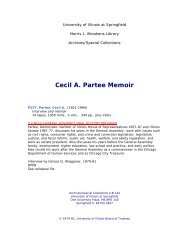Gerald W. Smith Memoir - University of Illinois Springfield
Gerald W. Smith Memoir - University of Illinois Springfield
Gerald W. Smith Memoir - University of Illinois Springfield
You also want an ePaper? Increase the reach of your titles
YUMPU automatically turns print PDFs into web optimized ePapers that Google loves.
<strong>Gerald</strong> W. mth 89<br />
1<br />
A. Yes, well in the two or three county area there, we knew one other<br />
pretty well, we knew the schools well enough . . . we superinten ts and<br />
principals attended enough <strong>of</strong> one another's activities that they ew who<br />
we were and they heard reports <strong>of</strong> what was go* on, you know, (la s)<br />
where we were. Well, at any rate beginning in the 1930's and, we1 ,<br />
particularly in the 1930's there were moves on the part <strong>of</strong> educati al'<br />
leaders and moves on the p& <strong>of</strong> the mmbers <strong>of</strong> the legislature to place<br />
this non-high school territory in high school districts. One <strong>of</strong> t e pieces<br />
<strong>of</strong> legislation that occuwred In the late 1930's was a provision thqt made<br />
it relatively easy for area outside a high school district to annex to the<br />
district. It was a procedure that did not call for a referendum. Any<br />
portion <strong>of</strong> a territory outside the district could petition the hi& school<br />
board for authority to annex to their district. Those petitions went to the<br />
County Superintendant <strong>of</strong> Schools and were addressed to the Board <strong>of</strong> Education;<br />
and if the requisite number <strong>of</strong> voters signed the petition and if the local<br />
school board, the receiving district, adopted a resolution that they were<br />
willing to accept them, on the basis <strong>of</strong> that resolution and the petition the<br />
County Superintendant <strong>of</strong> Schools was authorized to simply issue an order <strong>of</strong><br />
annexation.<br />
In the late 1930's quite a movement developed in that direction and I<br />
was involved in that at Alexis. When the Alexis high school district was<br />
established in 1923, another one <strong>of</strong> those post World War I things about which<br />
I spoke earlier, the fifty-two square miles, or fifty-two sections, <strong>of</strong> land<br />
joined the school district, so we had fifty-two square miles in the district,<br />
but surrounding it were another fifty-one square miles that did not cone in,<br />
again for the usual reasons -- the fmrs felt that the taxes were cheaper<br />
to pay the non-high school tuition than to be involved in the bond issue for<br />
the sdmol district. So, in Alexis over a period <strong>of</strong> about a gear and a<br />
half, all <strong>of</strong> those fifty-one sqm miles <strong>of</strong> territory did in- fact join our<br />
district, but in several separate parcel. I thlnk we probably had at least<br />
eight or nine sepwate resolutions or petitions and resolutions by our board,<br />
so we did in my the then almost double the area <strong>of</strong> the district. Now it<br />
did mctically nothing to the enrollment, because those people weE already<br />
coming, but it did strengthen the land base <strong>of</strong> the district and, <strong>of</strong> course,<br />
strenghtened the tax base <strong>of</strong> the district, and it gave the people in those<br />
fifty-one square miles a voice in the managemnt and govemnt <strong>of</strong> the district<br />
because up until that tiirne the young people attended the school but they<br />
had absolutely no voice in the govemnt, so it was possible then for people<br />
to serve on the Board <strong>of</strong> mucation, to vote at the elections, and to vote<br />
on the referenda and this kind <strong>of</strong> thing. So this was one <strong>of</strong> the pnincipal<br />
enterp~ises.<br />
Q. Well, I1m sum that- must have posed all kinds <strong>of</strong> new demands oq the<br />
superintendant-principal's tb~<br />
and energies . . .<br />
A. Yes, yes, it was a period <strong>of</strong> t-, <strong>of</strong> course, when you were ouq almost<br />
every evening <strong>of</strong> the week meting with one corrarmnity p u p or anotl-@-, or<br />
actually working with the petitioners because the people interested in petition-<br />
ing tended to come down to the school <strong>of</strong>fice and ask for help with the &&-<br />
ing <strong>of</strong> their petition and so forth. Yes, we attended m y meetings in the<br />
evening, and then on the fringe meas there was always that matter <strong>of</strong> do we<br />
go to Alexis or Aledo, do we go to Alexis or Seaton, do we go to Alexis or<br />
Momuth. There was always that fringe te&toxy where decisions had to be

















